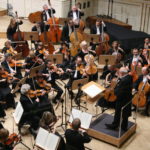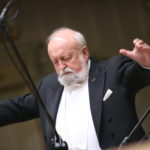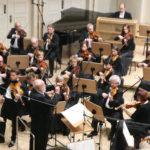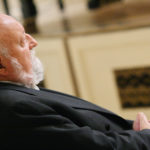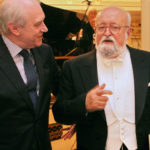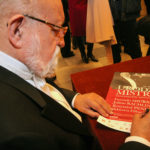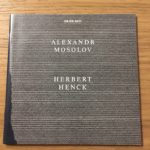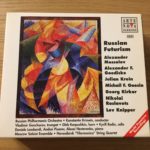news
Two concerts from the “Unknown Operas by Well-Known Composers” cycle were planned for the beginning of April in the repertoire of Poznan Philharmonic. On the 2nd of April the concert performance of “Faniska” by Luigi Cherubini under the baton of Łukasz Borowicz, performed by Poznan Philharmonic Orchestra, soloists and National Philharmonic Choir was to be held in Warsaw on the 2nd of April during the Ludwig van Beethoven Easter Festival, while on the 3rd of April – in the AMU Concert Hall in Poznan, also conducted by Łukasz Borowicz, along with the participation of Poznan Philharmonic Orchestra, soloists and Poznan Chamber Choir.
In relation to the Beethoven Festival, we will not meet today in the AMU Concert Hall but, for the next time, on the internet concert.
This time we are going to present a one-act opera by George Bizet – “Djamileh”. Its concert performance was held on the 7th of April 2017 in National Philharmonic in Warsaw at the 21st Ludwig van Beethoven Easter Festival in the framework of the “Unknown Operas by Well-Known Composers” cycle, and repeated on the 9th of April 2017 in AMU Concert Hall. This opera, performed by Poznan Philharmonic Orchestra, soloists and Poznan Chamber Choir led by Łukasz Borowicz was also recorded – the premiere of the album released by the DUX label took place on the 26th of October 2017.
“Djamileh” (with the libretto by Louis Gallet) is a love story between the title slave Djamileh and Cairene sultan Haroun. The plot, held in the ambiance of “The Arabian Nights”, is a typical example of the romantic fascinations of the Orient in the 19th century. And though the composer himself saw it as difficult to be staged, he succeeded in balancing the flaws of the libretto by the expressive sound aura.
Performers:
Jennifer FEINSTEIN (Djamileh) mezzosoprano
Eric BARRY (Haroun) tenor
George MOSLEY (Splendiano) baritone
Poznan Chamber Choir Bartosz
Michałowski – chorus master
Łukasz BOROWICZ – conductor
Poznan Philharmonic Orchestra
Wojciech Pszoniak – narrator (concert)
Piotr Kamiński – narrator (CD album)
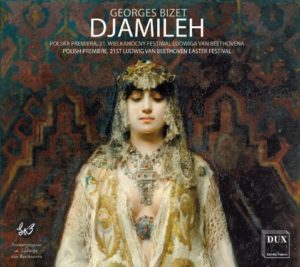
John Paul II… Every one of us has his own picture of this figure in one’s memory. Today is the 15th anniversary of the Polish Pope’s death. During his pontificate Poznan Nightingales sang for him several times. Let’s go back to these moments and reflect upon them…
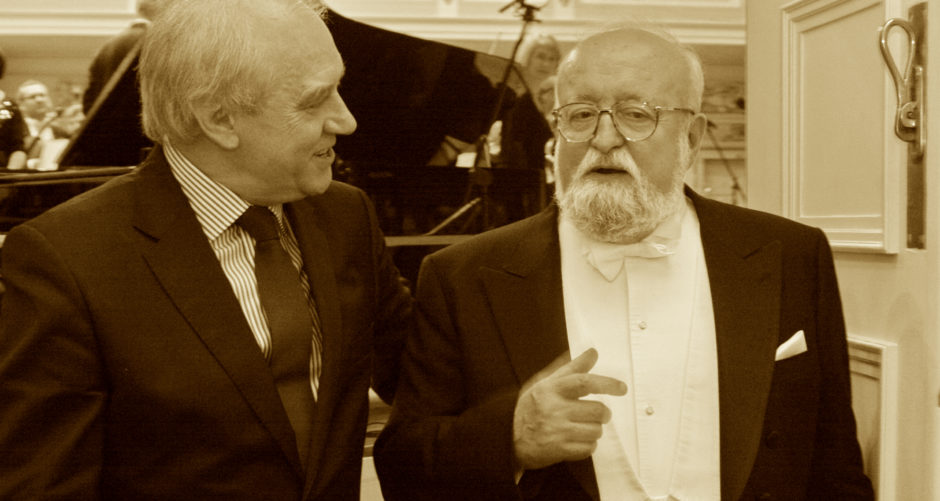
It happened almost 57 years ago. From the summer camps of Poznan Boys’ Choir in Człuchów, besides a beautiful lake, I also remember daily rehearsals. It was because we, then 11-, 12- and 13-year-olds, came into contact with the music that was entirely unfamiliar, even incomprehensible. Though we considered the motets of Bach or Wacław of Szamotuły as “ours”, these odd-looking notes and the sounds flowing from them (dissonances, tone clusters, exclamations) were entirely strange for our eyes and ears. These feelings accompanied me during the first rehearsals of a new piece – “Stabat Mater”. One of the rehearsals was attended by the composer himself. What an experience it was!
October 1963. Berlin. Komische Oper – our concert at the Berliner Festtage festival. The event’s culmination was the premiere foreign performance of the work – written for three choirs a capella, closing with a noble D major. Afterwards long-lasting applause and ovation, while the day afterwards – wonderful reviews.
This was my first contact with the music and… Krzysztof Penderecki. “Stabat Mater” became later a movement of “St Luke Passion”, a piece that opened the Polish artist doors to grand concert halls and musical centers of the world. And “Stabat Mater” – the key concert point of Jerzy Kurczewski’s choir, especially abroad.
Andrzej Lesicki, my peer, then 13-year-old, was one of the choirsingers at the Berlin concert. Now he holds the post of the rector of Adam Mickiewicz University – the title of doctor honoris causa from this institution was granted to Krzysztof Penderecki almost a quarter of a century later.
For many subsequent years my contact with the music of this composer was occasional. I remember that my choir friends recorded music for a children’s opera “The Most Valiant Knight” staged by Poznań theatre “Marcinek” (now The Animation Theatre). I also recall my surprise, when I listened to the soundtrack of the film “The Manuscript Found in Saragossa” (kind of a pastiche of the works of early masters). And a huge impression that the staging of the opera “The Black Mask” in Autumn 1987 in the Poznań Opera House made on me, same as a decade later – the monumental Symphony No. 7 “Seven Gates of Jerusalem” performed in the fara parish church.
In the 90s I talked to Maestro several times as a journalist, always admiring his erudition and brilliance. More and more I marveled at the consequence in creating music referring to the main human values: faith and truth. And also at the understandability of his works.
When I took over the Poznan Philharmonic I knew, that I should invite here the most prominent Polish composers. I didn’t manage to invite Henryk Mikołaj Górecki and Wojciech Kilar due to their health conditions, in spite of very nice conversations and great kindness from their side. While Krzysztof Penderecki had, like always, a tightly packed schedule. Knowing that in 2013 he would celebrate his 80th birthday and that he would be then sought-after not only in Poland, I figured we could suggest that he came a year before. Above all, his 79th birthday fell then (in 2012) on Friday, which is our habitual concert day. Maestro was so happy with his invitation to Poznań after many years that he suggested to perform with our philharmonic orchestra a Polish premiere of his recent symphonic piece – Double Concert for violin, viola and orchestra, which only a month ago had its world premiere in the Golden Hall of Musikverein in Vienna. In the capital of Austra Mariss Jansons conducted the work, while in AMU Concert Hall – the composers (in both performances Julian Rachlin, to whom the piece was dedicated, played the solo part on viola). In the second part of the concert held on the 23rd of November 2012 Krzysztof Penderecki led one of his favourite symphonies – No. 7 by Ludwig van Beethoven.
This evening (aired on Polish Radio Program II) the Jubilarian also collected the Jerzy Kurczewski Awards he was granted some time before as well as received numerous, mostly musical birthday gifts-surprises. The previous day in the Roman Maciejewski park he planted a beech tree grown in his own botanical garden. Besides music, trees were his greatest love. As he used to say, trees have roots both in the earth and in heaven. The unique park in the residence of Penderecki family in Lusławice confirms his love to trees. Maestro chose all the specimens and planted a majority of them himself.
After the Poznan concert we made a decision with the Hero of the evening that the Poznan Philharmonic will invite him a year before his “round” birthday to lead the concerts in a double role: as a composer and conductor. We entered the calendar a date in November 2017 and set the repertoire… It turned out later that Professor is to receive at that time his honoris causa doctorate from the Indiana University and conduct his “St Luke Passion” in Bloomington. We had to look for another date…
We met several time in different places and circumstances. In May 2018 in London we could have a longer conversation. Łukasz Borowicz conducted the London Philharmonic Orchestra in Royal Festival Hall. The concert’s repertoire included Violin Concerto No. 2 “Metamorphoses” by Krzysztof Penederecki, with the solo part of Anne-Sophie Mutter. The composer arrived to this event with his wife, and at dinner we faced each other at the table. He always said that he would have to live a 100 years to complete all the orders he accepted, I asked what he was working on at the moment? And did he still start his daily work early in the morning? I heard that it’s history, he cancelled some of his commitments, like composing an opera for Wiener Staatsoper. That currently he writes mostly chamber music which absorbs him.
When saying goodbye, we referred to the next artistic meeting in Poznań. I asked what he would like to perform then?
‘Credo’, he said, ‘One of my most important works. Maybe even the best one? ….’
Recalling these moments in my memory today, I noted the statement of one of Maestro’s friends from the Academy of Music in Krakow: “Once Krzysztof Penderecki remarked: a human being reaches a point in his live when he needs to say: I believe. CREDO.”
Wojciech Nentwig
29th of March 2020

We were deeply saddened to hear that on the 29th of March 2020 at the age of 86 Krzysztof Penderecki died – a prominent Polish composer, one of the icons of Polish culture, an artist associated with Poznan Philharmonic for many years.
Maestro, you will always be among us, just like on the day of your 79th birthday, when you conducted our orchestra at the premiere Polish performance of the Concert for violin, viola and orchestra.
We would like to express our heartfelt condolences to the closest family and friends for their loss
Wojciech Nentwig along with the Poznan Philharmonic ensembles and the staff
On Saturday, the 28th of March, at 8 pm on air of Polish Radio Program II “The Pariah”, the opera of Stanisław Moniuszko will resound, played by the Orchestra of Poznan Philharmonic. Its concert performance (in the Italian-language version) was recorded on the 10th of March 2019 during the 23rd Ludwig van Beethoven Easter Festival in the National Philharmonic in Warsaw. The Saturday program, part of the “Opera Under the Stars” cycle, will be led by editor Marcin Majchrowski.
“The Pariah” under the leadership of Łukasz Borowicz, performed by Poznan Philharmonic Orchestra along with the soloists and the National Philharmonic Choir, was also recorded on CD. The album was released by DUX label. The festival performance of the piece and its recording was connected with Poznan Philharmonic’s celebrations of the Year of Stanisław Moniuszko.
“The Pariah” is the last completed opera of Stanisław Moniuszko. The libretto of this three-act work, the action of which takes place in India, was written by Jan Chęciński and based on the motives of Casimir Delavigne’s tragedy under the same title.
Performers:
Katarzyna Hołysz (Neala) – Soprano
Robert Jezierski (Akebar) – Basso
Yuri Gorodetski (Idamore) – Tenor
Szymon Komasa (Djares) – Baritone
Tomasz Warmijak (Ratef) – Tenor
Justyna Jedynak-Obłoza (Sacerdotessa) – Soprano
National Philharmonic Choir
Bartosz Michałowski – Chorus Master
Łukasz Borowicz – Conductor
Poznan Philharmonic Orchestra
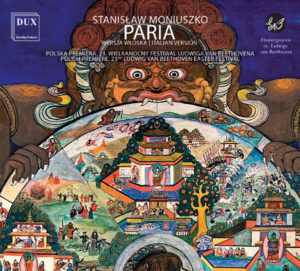
Next Friday during the next INTERNET CONCERT you can listen to Ludwig van Beethoven’s overture “Zur Namensfeier” Op. 115 and Ignacy Jan Paderewski’s Piano Concerto in A minor, Op. 17 performed by Szymon Nehring and Poznan Philharmonic Orchestra led by maestro Marek Pijarowski.
We encourage you to read the introduction to the program of the concert held in Konzerthaus Berlin on the 23rd of October 2018.
Ludwig van Beethoven – overture “Zur Namensfeier” Op. 115 (dedicated to Prince Antoni Radziwiłł)
Ludwig van Beethoven completed his symphonic overture “Zur Namensfeier” in 1815. The subtitle refers to the feast of Saint Francis of Assisi, which fell on the name day of Franz the 1st, emperor of Austria (the 4th of October). Though the premiere performance was scheduled for October, the overture resounded for the first time on Christmas 1815. In the initial theme we can hear the motives from “ Ode to Joy” from the 9th Symphony, composed 9 years later. The musical piece was dedicated to the Polish Prince Antoni Radziwiłł, whose figure is worth recalling. He was a politician, musician, patron of artists, viceroy of the Grand Duchy of Poznan and was regarded as the most prominent representative of Polish-Prussian political orientation in the 19th century. He was sure that his kinship with the Prussian reigning House (in 1796 he married Frederica Dorothea Louise Hohenzollern, daughter of Augustus Ferdinand, who was the brother of Frederick II the Great – King of Prussia) would obligate him to active conciliation between the Poles and the Prussian authorities. His plans of the Poles taking the side of Prussia against Napoleon and of inducing Prince Józef Poniatowski to support Prussia and Russia in 1813 failed. Antoni Radziwiłł was also a composer, cellist, guitar player and singer, and his palace in Berlin served as a center of musical, literary and theatrical life. His circle of friends included Johann Wolfgang von Goethe, Ludwig van Beethoven and the parents of Felix Mendelssohn. In his hunting lodge in Antonin near Ostrów Wielkopolski he hosted Frédéric Chopin twice, who dedicated him his Trio in G minor for Piano, Violin and Cello. Whereas Felix Mendelssohn presented Radziwiłł his first piece. Radziwiłł also became a part of the History of Music – he was the first to write the music to “Faust” by Goethe, which was admired by Chopin himself.
Ignacy Jan Paderewski – Piano Concerto in A minor, Op. 17
Piano Concerto in A minor, Op. 17 by Ignacy Jan Paderewski is one of the most popular pieces not only in the artistic output of the composer, but also in the Polish Piano literature. He composed the first excerpts of the piece in his twenties, and the whole Concert was written in six years in different places – Zakopane, Cracow, Vienna, Paris. The premiere performance took place in Vienna in the beginning of 1889, with the interpretation of the pianist Anetta Yesipova, the second one – a few weeks later in Warsaw. The piece is filled with beautiful melodic line, subtly expressed emotionality, clear texture and transparent structure, with an exposed virtuosity of solo piano part at the same time. The first movement, Allegro, has the sonata-allegro form, second, Romanza, refers to a song structure, while the final Allegro molto vivace features the form of rondo – the last movement closes with a festive chorale. Ignacy Jan Paderewski (1860-1941), in his time seen as the hope of Polish composition, mostly dealt with piano performances, as well as patriotic, social and political activity, working hard to regain Polish independence. He is remembered as a prominent artist and a statesman. Besides Piano Concerto, he also wrote Polish Fantasy for Piano and Orchestra, monumental Symphony in B minor “Polonia” (1907), Manru opera, songs for voice and piano and numerous piano works – the most famous are Minuet, Polish Dances, Variations and Fugue in A minor and Tatra Album.
Justyna Kroschel
Current situation made us realize what phenomenon (not fully definable) is music performed live. Thousands of music institutions’ visitors, including Poznan Philharmonic will lack this experience in the nearest future (how long exactly?).
We are aware that no recordings can replace them, however we would like to offer our constant and frequent music lovers (maybe also new recipients) regular concerts via Internet. Concerts with participation of our orchestra, wonderful conductors and soloists. First concert is tomorrow, on the 20th of March.
Just like during live concerts of Poznan Philharmonic – let’s meet on Friday evenings at 7 p.m. on our website.
There would be only one moment to experience these events – on a given Friday, only from 7 p.m. till the end of the concert.
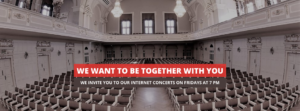
Although in the modern world the works of art from the 1920’s created by artists coming from the Soviet Union is now triumphing and shown in the most renowned museums in the world, the music from this epoch is still waiting to be discovered.
Ladies and Gentlemen, Dear Music Lovers
in the cycle presenting our fascination, and sometimes also inspiration for creating concerts repertoire, I would like to bring back the program of the concert, which was to be held last Friday, on the 13th of March. Besides well-known works of Beethoven and Prokofiev, also the music of Nikolai Roslavets was to be presented. His piece entitled „In den Stunden des Neumonds” has never before been performed in Poland.
Roslavets is the representative of the first generation of Russian composers, whose adolescence and the most creative period fell to the years of unusual development of art – the short period of avant-garde in the Soviet Union. It is a huge historical paradox of the 20th century that in the country who approved experiments in all artistic fields, not long afterwards the new political regime became the synonym of subjugation and totalitarianism. Avant-garde artists, who recently praised freedom (allegedly gained also for art), soon became the first victims of repression.
Although in the modern world the works of art from the 1920’s created by artists coming from the Soviet Union is now triumphing and shown in the most renowned museums in the world (I will just mention a few of the most famous names: Kazimierz Malewicz, Wassily Kandinsky, Natalia Goncharova, Marc Chagall, Lazar Lissitzky [El Lissitzky]), the music from this epoch is still waiting to be discovered.
The works of Roslavets didn’t appear in the program of the concert planned for the 13th of March by chance. We wanted to present the work of this revolutionary composer and remind that nowadays the music of Ludwig van Beethoven, apparently „softened and smoothed” by the perception shaped by pop-culture, at its time was a synonym of modern, breaching conventions and barriers of art, also the ones that seemed irrefutable.
We managed to have one rehearsal for the concert scheduled for the 13th of March. Roslavets’ music resounded. Along with the Orchestra of Poznan Philharmonic we had an impression from the first notes that the music transfers us to another dimension. Similarly like in the late works of Alexander Scriabin, we can hear the tutti sound intricately woven from the polyphonic layers, which reminds us of a musical stream, a spectrum of sound. The experience is hard to describe. What’s important, this type of narrative, present in some of the Prokofiev’s works, was practically abandoned by subsequent generations of composers. I recommend you to listen to Roslavets’ works available on the internet. I promise we will present you the premiere Polish performance of the aforementioned poem „In den Stunden des Neumonds”. Meanwhile you can listen to it on Youtube:
https://www.youtube.com/watch?v=y5IWId9sLdE
In our repertoire recommendations that we are going to present on the profile of Poznan Philharmonic for listeners interested in this topic, I would like to recommend a few albums, which you may be able to listen to via websites (or maybe you have them in your personal collections). They are the renditions of works by composers from Roslavets’ generation, now almost entirely forgotten. Maybe in the current situation it will be easier to find time for this activity:
Russian Futurism – box released by ARTE NOVA (unfortunately, the company doesn’t exist anymore) features recordings of chamber and symphonic music of such composers as: Alexander Mosolov, Alexander Goedicke, Julian Krein, Georg Kirkor, Mikhail Gnesin, Lev Knipper and Nikolai Roslavets;
Symphony No. 1, Op. 7 by Gavriil Popov performed by London Symphony Orchestra led by Leon Botstein, conductor known to the listeners of Poznan Philharmonic; on the album published by TELARC label there is a most interesting piece Theme and Variations Op. 3 by Dmitri Shostakovich;
finally, the lovers of audiophile sound I would like to recommend an album released by ECM, dedicated to the piano works of Alexander Mosolow (Herbert Henck on the piano).
Wishing you poignant perception of this extraordinary music,
Łukasz Borowicz
Dear Ladies and Gentlemen,
Friends of Poznan Philharmonic,
the events of the recent days have manifestly influenced the situation and plans of our institution. We sorely feel the lack of contact with you, as well as the inability to share the joy of participation in concerts. Our thoughts keep returning to the programs of scheduled concerts, the works and composers that we would like to present you or bring back. In the current situation we decided to intensify our presence on the internet.
We are going to prepare for you:
- recommendations of works (and their performances available on the internet), which were planned in the programs of our concerts;
- commentaries and personal reflections of conductors and soloists associated with Poznan Philharmonic, who will bring us closer to their favourite pieces of music and composers;
- surprises which, hopefully, will provide you nice and unforgettable experience.
We wish to be together with you, we dream that bond created thanks to music will endure the all the difficulties.
With cordial greetings,
the ensembles and the staff of Poznan Philharmonic
We would like to inform you that in relation to the current situation of preventing the spread of coronavirus SARS-CoV-2, the box office of Poznan Philharmonic is opened between 1 pm and 5 pm on the 12th and the 13th of March, while from Monday the 16th of March it will be closed until further notice. The reimbursement of tickets for the cancelled concerts, bought in the box office, will take place after the reopening of the box office.
You can clarify any doubts by calling one of the following numbers: + 48 61 852 47 08, + 48 660 405 813.


